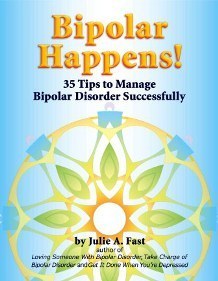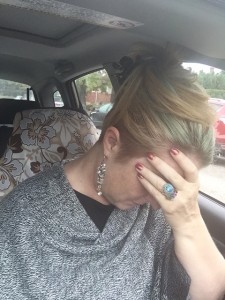Julie A. Fast's Blog, page 33
October 13, 2016
Bipolar Disorder and Holiday Cheer
Get ready for the holidays- today! I know, it’s not even Halloween yet here in the States, but planning ahead really works.
I’m planning my winter holidays right now. I tend to get overly stressed when I don’t plan ahead for holidays. There is so much cheer around me! Holiday cheer! If only regular people knew what it’s like for us. Especially those of us who have some odd family dynamics.
What are you doing for Thanksgiving? Where will you go for the holidays in December? Do you have plans for New Year’s? No matter where you live, December and January are usually on a different schedule. Bipolar disorder doesn’t like schedule changes!
Loneliness and suicidal thoughts can peak during the holidays. If we plan now- In October- we can make things really different this year and have some holiday cheer ourselves.
Julie
If you want to be with PEOPLE during the holidays, I highly suggest the website MeetUp.
Related posts:
Julie’s Message: Plan Ahead for New Year’s Eve!
July 4th Holiday Bipolar Blues (but not in 2014!)
Closed: I hope you had a great holiday season. The next call: Bipolar 102 will be announced soon.
October 10, 2016
Celebrate

Did you know: Bipolar disorder is much more than mania and depression? We have psychosis, anxiety in all of its forms with a great emphasis on OCD behaviors, ADD problems, physical restlessness and an overall intellectual curiosity that causes us to continue seeking the truth in life even when bipolar slaps us in the face.
We must celebrate what we are.
Julie
Related posts:
It’s World Bipolar Day… Let’s Celebrate!
Tips for Managing Bipolar Disorder Anxiety
Bipolar Rapid Cycling: A mood swing record?
October 9, 2016
Group Coaching Call: Parent of a Teenager or Adult Child with Bipolar Disorder?

Parent of a Child with Bipolar Disorder?
Join Me for an Important Event:
Group Coaching Call for Parents of Teens and Adult Children with Bipolar Disorder
As a parent of a child with bipolar disorder, you face unique challenges. Your child may be dependent on your financial support whether living inside or outside of the home, may refuse to seek help, refuse to accept the diagnosis or exhibit many of the following behaviors:
Goes on and off medications
Struggles with management
Uses drugs (especially pot) to self medicate
Drinks heavily during mood swings
Spends time in jail
Has out of control mania
Can’t function due to depression
Needs help for under diagnosed psychosis
Desperately wants help, but can’t change
Is often irritated and angry
Says that YOU are the problem
Is a lovely, sweet and kind person who is under the control of an unforgiving illness
This creates chaos and negatively impacts the entire family. Unfortunately, getting help isn’t easy and knowing what to do isn’t innate. You certainly didn’t sign up for this when you decided to be a parent! I understand that you are greatly worried about what to do and that your heart breaks to watch your beloved child struggle so much because of this devastating illness.
I am here to offer hope. You can learn what to do. This is a call for parents only. Parents’ needs are often overlooked when a child is ill. It’s time to figure out what works for you.
Here are the logistics for the calls. Their content is explained below.
Dates and Times:
Call #1: Tuesday, November 15th, 2016: 5:30 PM to 7:00 PM PST
Call #2: Wednesday, November 16th, 2016: 5:30 PM to 7:00 PM PST
(Other US time zones and international time zones are listed below.)
More about the calls:
I have a coaching practice where I not only help parents understand how bipolar disorder affects their child, but also how the child’s behavior has created negative patterns in the home. I often hear the following from my clients:
 “My child is the one with bipolar disorder, but the illness has taken over all of our lives.”
“My child is the one with bipolar disorder, but the illness has taken over all of our lives.”If this describes your situation, you are not alone. I call this the ‘hijacked house’ and it’s the result of negative patterns that occur when a child’s bipolar disorder has taken over the family dynamics. Hope is here and change can happen. These calls will help you recognize and change the three most common negative patterns that exist in a home when a child has bipolar disorder and show you exactly what you can do to change any of the behaviors you recognize in yourself.
Here are the three patterns we will cover on the calls:
Parents who have become desensitized to unacceptable behavior from a child. For example, “My son yells and screams at all of us and sometimes punches walls. We’re used to it.” Or, “My daughter stays out all night when she’s manic, even though she is living with us. I know she is having unprotected sex and is probably doing drugs. When I ask her to stop and tell her that it’s dangerous, she tells me to mind my own business.” And even more commonly, “We pay for all of our son’s bills because he is too sick to work and can’t stay in school. At least it keeps him off the streets.”
Parents who have unrealistic expectations for a child. For example: “My daughter is on meds and has been out of the hospital for three months. She needs to look for a job!” or, “I don’t know why my son stays in bed all day. He needs to get up and get on with life.”
The ‘male/female Continuum’… also known as mothers and fathers with different views on how to help a child. For example, “His mom is always asking questions and driving him crazy. I think he just needs some space to figure himself out.” Or, “His dad doesn’t want to read about this illness and tends to avoid the conversation instead of talking about bipolar disorder.”
The calls will help you understand and recognize these patterns and ultimately show you how to build a healthy foundation for your child’s stability.
The more information you have, the more stable and joyful your home can be. Won’t it be great to find some relief!
How the calls work:
Each call is 90-minutes. You will quickly determine what isn’t working and learn strategies you can immediately use to positively change the dynamics between yourself and your child.
Call #1 – Describes and helps you recognize the three patterns. I use vivid stories from my many years as a coach and describe in detail what each pattern looks like so that you can honestly examine your current situation and decide on the patterns you want to change. At the end of call #1, I will send homework you can fill out and use to assess your own situation. You will also be asked to prepare your most pressing question related to bipolar disorder and your child.
Call #2 – Teaches you how to turn around these patterns for the better, so that you can have more energy and happiness in your own life while still providing appropriate help for your child.
I guarantee these two calls can change your relationship with your child for the better. Never forget… knowing how to help your child manage this illness is not innate. It helps to learn proven strategies from someone who is a coach and also has the illness!
Ordering information:
Two Group Coaching Calls for Parents of Children with Bipolar Disorder
Dates: Tues. November 15th
& Wed. November 16th, 2016
Times: Each call is 90 minutes and will be held from:
5:30 PM to 7:00 PM PST
(Other US times: Calls start at 6:30 PM MST, 7:30 PM CST, and 8:30 EST)
(London, England call times: 1:30 AM BST)
(Melbourne/Sydney, Australia call times: 10:30 AM AEST)
International callers, please note the date of the calls. For other international times, click here to convert to your time
Price: $149
Please note that though these calls are for parents, they will help anyone who supports a teenager or adult with bipolar disorder including grandparents and siblings. I also welcome all health care professionals to join the call.
There is HOPE. You truly can learn proven strategies to create a stable and loving family environment.
Julie
Here is what previous participants had to say:
“We thought that letting our son move back in was a good thing. Now he controls our house like an angry monster yelling from the top of the stairs. I’m a strong person, but talking to him when he’s in a manic episode is like what Julie calls walking into the bear den. Then his mood changes and he will finally come downstairs in his smelly tshirt and tell me he loves me and how sad he is and that he wants help. He will eat cereal. His sisters are worried and scared. He gets suicidal so quickly. He has a doctor, but the doctor isn’t doing enough to help Louis. It’s all about medications – they work when Louis takes them, but what about when he refuses? This coaching call changed my life. My first change was the night after the call with Julie and I made a decision that it was up to me to make the changes I wanted made and then help Louis do the same. I got confidence I didn’t know I had. The best part was how easy it was- Julie gave me the exact words to use when he is in a mood swing. We stopped looping conversations. My wife is on board now and even the girls know what to do. Louis has a way to go, but he no longer controls our house and we all have hope.”
“Julie, I’ve never met anyone like you. You have such a unique perspective. I feel like I understand what my son goes through now. You have been there and when I can’t understand him and want to just tell and tell him I love him and he has to take his meds, you’ve taught me what to do instead. And it’s working.”
“Julie, I feel you saved our family. The coaching call helped me work with my husband about enabling our son especially around video games and drinking in the house. We came up with a plan for chores, his room and he no longer screams at me when I try to touch something. Thank you. Brandon is more stable and has found outside support. I know you’re not a marriage therapist, but this call helped our relationship as much as it helped us help our son. My husband realized that he can talk with Brandon and not just let him do what he wants. I learned that I often talk more than needed and we are now meeting in the middle.”
Families come in all shapes and sizes. No matter how you define family, the strategies in the When Love is Not Enough coaching call for parents can change your life. I look forward to having you on the call.

Related posts:
Parent of a Child with Bipolar Disorder?
Sold out: Group Coaching Calls for Parents of Children with Bipolar Disorder
Bipolar 101 Group Coaching Call Thank You!
Loving Someone with Bipolar Disorder
Click here to view the embedded video.
Partners and family members of a person with bipolar disorder face many of the same challenges. They often have intense loyalty towards the person they love, but at the same time there may be anger, frustration and fear. For partners, the main concerns are usually whether the relationship can survive the illness and how bipolar disorder will affect children. For family members, the main concerns are usually the safety of their loved one and worry over how the illness is affecting the family dynamics. If one of these describes you, or if you simply aren’t sure how the illness may affect your life, please know there is hope. This page addresses some of the issues you may find yourself in today and suggests ways you can help your loved one get better. There is a link at the end of the article that will lead you to more information on my family and partner coaching.
Essential Information for Family Members and Partners
Communicating during a mood swing is the number one relationship problem when a person you love has bipolar disorder.
Up to 50% of people with bipolar disorder refuse help or refuse to accept the diagnosis (yet you still have to live with the symptoms).
Loved ones with bipolar disorder may be enthusiastic one day and withdrawn the next for no obvious reasons.
50% of people with bipolar disorder have trouble with alcohol and/or drugs. Often this is an effort at self-medication.
Bipolar medication side effects can be very detrimental to a romantic relationship due to sexual mood changes and body changes.
This list may seem frightening, but it’s important to know that relationships can definitely be repaired, even after dangerous and life changing mood swings. Solid and loving relationships based on open communication are possible. And even if you love someone who can’t get well or isn’t getting well, you can learn how to help yourself first and then work with them to improve your relationship. In my work as a family and partner coach, I see miracles every day.
When my partner went into a three month manic/psychotic episode in 1994 and then into a suicidal depression, I truly didn’t know if he would ever get better. Would bipolar disorder change his brain so that he couldn’t work? Would I have to be his caretaker from now on? Where would we find the money to pay for his care? Would he always need medications? Would he live? I remember being scared every day. The reality was that he did get better. He was able to work again. And our relationship survived.
Denial of the Diagnosis
The most often asked question I get from family members is, “How can I help my loved one accept that they have bipolar disorder?” Before answering this question, let’s look at some of the reasons many people with bipolar disorder may be in denial of the illness.
One reason is that it can often be too painful for someone to face the future. Imagine what it’s like to have a lifelong illness that affects the way you think and feel, and that requires daily management and major lifestyle changes. For many people, the changes may feel too great. “Stop going out? I can’t do that! Quit my high pressure job? Are you joking? Stop drinking? Stop staying up late? Do you want me to be a monk?” Bipolar disorder often requires sweeping lifestyle changes in order to stay healthy, and it can be a lot easier simply to deny that there is a problem than accept this reality.
Denial can also be a symptom of bipolar disorder itself. People who are in great crisis because of bipolar disorder and yet still refuse to admit they have an illness may appear to be stubborn and/or self destructive, but in reality it’s often the bipolar disorder that’s in control at this time—not the person. Even when you can clearly see that the illness is destroying their life, they may not be able to because the bipolar disorder won’t let them.
Mania also plays a large role in denial. When someone suddenly stops their medication and denies they’re sick, this often indicates a manic episode and needs to be taken seriously. Mania often feels very good and can make a person forget the times when they were severely sick. Your loved one may believe they no longer have bipolar disorder, or that they never had it at all but were just depressed. Mania can actually change a person’s thinking from reasonable to extremely unreasonable and dangerous in just a few short days. It’s therefore important for everyone involved to recognize the signs of a manic episode before it goes too far. If you know for sure that your loved one has stopped taking their medication due to mania and they refuse to discuss it with you, it is time seek advice from a health care professional. This is especially true if the person is also showing signs of psychosis.
A dual diagnosis can also contribute to a person’s denying they have bipolar disorder. “Dual diagnosis” means a person has a diagnosis of drug and/or alcohol addiction as well as bipolar disorder. Drug and alcohol abuse are the number one reason for “non treatment compliance” and “poor treatment outcome.” What this means is that if the person you care about drinks or uses drugs (pot included), they may deny the diagnosis even more, because they would have to not only accept that they have bipolar disorder, but also stop their drug or alcohol use.
Take care of yourself first!
These are just a few of the reasons a person may deny a diagnosis of bipolar disorder. There are many others, and it can be extremely frustrating for partners and family members when their loved one refuses to get help. I work with many family members and partners in this situation and I always ask them, “If your loved one won’t get help right now, what are you going to do?” I don’t mean what are you going to do about them, but rather what are you going to do to help yourself? There are many options. The first step is to create a management plan that you and the people around you can use when you have to interact with your loved one. There are ways to communicate with your loved one even when they are in a severe mood swing. You can learn to stop fights, deflect accusations, deal with destructive behaviors and be there for the person you love whenever possible—all without losing yourself.
When someone just isn’t getting better
There are also many people with bipolar disorder who do accept the diagnosis and are open to treatment but are simply not getting better. They may have tried many medications, but their mood swings are still raging. In this situation they may turn to their partners or family members in desperation for help. Often the only thing family members know how to do is seek further medical advice and hope that love and support will be enough to make things better. Unfortunately, this is usually not enough. When a person isn’t responding well to traditional treatment, a comprehensive management program is an absolute necessity, one that addresses specific behaviors and symptoms.
If you are in any of the situations mentioned above, you probably do not know what to do. It is not innate to know how to help someone manage bipolar disorder. Most treatment books on bipolar disorder are only for those with the illness, or else they are fact-based books explaining bipolar disorder on a technical level. While these books can be helpful, what family members and partners need most—especially once the illness is in full swing or if the person they love has tried everything and can’t get better—is a practical, hands-on management plan to deal with all the various situations that arise.
I coach partners and family members of those with bipolar disorder. My goal is to help you get a loved one into treatment and then started with a management plan. My success rate is high. I understand what you are going through. Here is a link to learn more about my coaching: Family and Partner Coaching.
A Note
It can be hard to love someone with bipolar disorder. What you may have learned in the past about maintaining stable and loving relationships simply doesn’t apply when faced with this illness. You must therefore learn everything you can, including the various bipolar medications and how they work, the full spectrum of symptoms, triggers and behaviors specific to the person you love, etc. You must also learn effective ways to communicate with your loved one around the illness, especially when they are in a mood swing. And you will need to create a plan for yourself that you can use with your loved both during and between mood swings.
Related posts:
Bipolar Family and Partner Coaching
Julie A. Fast Partner and Family Coaching: A Conversation Between a Worried Mother and Her Defiant Daughter pt. 2
Loving Someone with Bipolar Disorder: Understanding and Helping Your Partner
Bipolar Happens! is a Bestselling Bipolar Disorder Book on the Kindle
 Bipolar Happens: 35 Tips and Tricks to Manage Bipolar Disorder is often the #1 Bipolar Disorder book on the Kindle.
Bipolar Happens: 35 Tips and Tricks to Manage Bipolar Disorder is often the #1 Bipolar Disorder book on the Kindle.
That’s exciting. I went to the Kindle store to see how my books Loving Someone with Bipolar Disorder and Take Charge of Bipolar Disorder were doing on the bipolar disorder page. These books are in the top ten ranking- and then I saw that Bipolar Happens! was doing well on Amazon.
Fantastic! Bipolar Happens! is an enjoyable book about a serious topic.
Guess what- it’s only $.99 I want it to be available to everyone.
Yes, I think this is a great deal and a good way to get helpful information about bipolar disorder at minimum cost. Bipolar Happens! was my first book. I knew I wanted to talk about how I manage the illness, but I also wanted to tell stories about how it affects my life daily.
There are stories about anger, manic spending, anxiety at a baseball game and what it feels like to be psychotic! It’s a book that family members love too. I love it myself. It’s hopeful.
Click here to go to amazon.com. You can read part of the book and then add it to your Kindle. Wow, $.99!
Julie
PS: If you’re new to my work, this is a great way to experience my writing style and the quality of my information. If you like it, you can come back for more.
Related posts:
Bipolar Happens! is a Top Bipolar Disorder Book on the Kindle!
Bipolar Happens! is #1 Bipolar Disorder Book on the Kindle!
Bipolar Happens! is the #1 Bipolar Disorder Book on the Kindle!
October 8, 2016
The End of Bipolar Disorder Depression Isolation
The following is an excerpt from latest blog on Bp Magazine.
by Julie A. Fast
I used to think that being alone was a strength. I grew up with the very 1980s and 1990s idea that we have to ‘learn to be alone in order to really be with another person.’
That might make sense if you are stable and life is going well.
For people with bipolar disorder, alone-ness and learning to be by yourself before you can really succeed can be dangerous if taken out of context.
I have found that accepting people into my life when I am depressed is far more difficult than being alone. Depression makes me isolate. It makes me see the phone as an instrument of torture. It makes me turn to social media instead of reaching out to live human beings.
Many depression episodes are the personification of loneliness in that our brains tell us that being alone is all we deserve and that life is a lonely path we have to travel without support or love.
Does this sound familiar:
I’m depressed. I need contact, but I can’t reach out. I’m lying in my bed watching another British mystery when there are three messages from friends on my phone. I have the thought, ‘No one cares about me which is why no one is calling me.’ I am destined to be alone- lying on a bed in a dark room instead of getting out in the world. This is my life and it’s horrible.
Good heavens Julie! What is wrong with this picture?
Maybe you an spot the huge inconsistency between reality and what my brain is saying……..
Click here to read the rest of the article on the Bp Magazine website.
Related posts:
Is it depression or bipolar depression? A Quiz!
Bipolar Disorder Depression: An Unhappy Morning from My Past
Manic Depression rapid cycling: What can one do?
October 7, 2016
Where’s Julie? Oxford University Mental Health Panel on October 25, 2016
The Student Mental Health Crisis – What Next?
I’m speaking on a mental health panel at Oxford University in England on October 25th and could use your help. If you are a college student or know a college student in the US who has bipolar disorder, what is available at school for helping the student? I’m sure the British crowd will ask me about the US system. I know a lot about it from a parent perspective and would like to hear from someone who is actually in school. Thanks!
From the Oxford Union website.
The Student Mental Health Crisis – What Next?
25% of adults suffer from mental health conditions; this figure doubles among Oxford students. Many believe that drastic action is needed to respond to this crisis in care, engaging with both the general stigma and failing institutions.
Panellists:
Stephen K Amos – Stand-up Comedian and patron of mental health charity Time to Change
Dr Linda Papadopoulos – TV psychologist and academic
Dr Nicola Byrom – Founding chair of the charity Student Minds
Julie Fast – International bestselling writer on bipolar disorder and depression
Liz Fraser – Director of Headcase
***
It would be great to hear your opinion on what you feel is working and what is not working here in the States. You can find more information about this topic on my Julie A. Fast Facebook page.
Julie
Related posts:
Parent of a University Student with Bipolar Disorder?
We need to talk: Violent Behavior in People with Mental Health Disorders
Media Fast for Mental Health Happiness
Interview in Slate Magazine for a Daughter who Has a Father with Bipolar Disorder
 I was just interviewed for Slate Magazine regarding a daughter who wants to help a parent who has bipolar disorder manage an inheritance. Fascinating. I LOVED talking with columnist Helaine Olen. My interview is in the second section.
I was just interviewed for Slate Magazine regarding a daughter who wants to help a parent who has bipolar disorder manage an inheritance. Fascinating. I LOVED talking with columnist Helaine Olen. My interview is in the second section.
Here is the question from a reader to Helaine Olen for her
How Do You Help a Parent With a Spending Problem?
column:
Helaine,
My father recently received an inheritance. He intends to spend part of it on a house, and I assume save the rest for his retirement, which is eight to 10 years away. Here’s the issue: My dad has bipolar disorder. The condition is under control with the help of medications, but he has experienced severe manic episodes in the past that have caused him to become impulsive and reckless, financially and otherwise. He’s made big, impulsive purchases like a riding lawnmower; taken impromptu trips with no plans to return; and stolen money from his own children’s piggy banks and savings accounts after getting cut off from family finances. He’s divorced from both my mother and my stepmother, and I’m wondering what I can do to protect him and our family if he experiences another manic episode, especially now that he would have access to more money. I want to make it clear to him that I have no intention of interfering with his finances unless absolutely necessary, but I would want to limit his access to his money if he was significantly impaired or unstable, as well as have access to his accounts to make sure his bills would be paid if he could not do so himself. I would never, under any circumstances, take money out of his accounts for any other reason. I’ve brought up this topic before, and it clearly made him uncomfortable. I know he feels like people treat him differently even though he’s been stable and responsible with money in the recent past. My hope is he will be well for the remainder of his life, and I will never have to use this nuclear option. However, it’s a good possibility he will experience a manic episode again. What can I do to protect his investments and retirement?
Click here to read the answer and my interview quotes.
Let Helaine know what you thought of her answer. I really enjoyed our interview. She knows her stuff!
Julie
PS: Thanks to Helaine for such a great interview. When I started writing books about bipolar disorder around 20 years ago, people would say, “What is bipolar disorder?” Now, we are so open about serious mental health disorders, we can talk about management in a practical way. I have the illness. Like the woman who asked about her dad where I gave my opinion, I too have to get help from the people around me in order to stay financially stable. It’s great that we are finally talking about this in a rational way. Bipolar disorder is a genetic illness, passed through generations. It is very easy to diagnose and very, very difficult to treat. Our mania pretty much knocks out our frontal lobe functioning (Dr. Jay Carter has some great You Tube videos on this topic) and our ability to self monitor our behaviors is GONE. Her question is one that all of us affected by bipolar disorder much answer. How do we as people with the illness set up checks and balances if we get sick? How do the people around us find the courage and resources to talk with us about this tricky topic! I talk with my clients about this regularly. Yes, it’s hard to talk to a dad this way when you are the daughter, but it’s essential. Bipolar disorder doesn’t care about anything. All of us with the illness can benefit from putting our pride to the side and asking for help. Julie Fast
Related posts:
DBSA.. Julie Fast Podcast interview: Families and Bipolar Disorder
Get it Done When You’re Depressed Radio/Podcast Interview
My Bp Magazine Blog: An Interview with Sherry Joiner. What is the Difference between Bipolar Disorder and Schizo-affective Disorder?
October 4, 2016
Bipolar Disorder is Episodic… and that’s a positive!
 Bipolar disorder is episodic. This means that what you are going through today will not last. I remind myself of this when the mood swings are raging. I take myself back to when I was stable and remember that episodes end.
Bipolar disorder is episodic. This means that what you are going through today will not last. I remind myself of this when the mood swings are raging. I take myself back to when I was stable and remember that episodes end.
I work on myself while I am in an episode to get back to stability. It takes the majority of my time.
My work suffers. I isolate. I cry in frustration at what this illness does to me.
But, this is so much better than not helping myself. It’s so much better to know what I am up against than to wonder what is wrong with me.
There is NOTHING wrong with me. I have a physical illness called bipolar disorder and I do what I can do get back to stability when I am sick.
Then I get on with life.
Julie
Related posts:
One Bipolar Disorder Drama After Another!
Positive Changes in Our Bipolar Disorder World
No Drama Bipolar Lifestyle
BP Magazine Article: Bipolar Depression Distortion
 It takes a lot longer to worry about getting things done than it does to actually finish a project. This is something I’ve taught myself over the years. As I work on my new book, I have to remind myself to his daily. If I let myself, I would worry more than I would write.
It takes a lot longer to worry about getting things done than it does to actually finish a project. This is something I’ve taught myself over the years. As I work on my new book, I have to remind myself to his daily. If I let myself, I would worry more than I would write.
Isn’t amazing how this illness can distort our thoughts to the point we don’t even know who we are anymore?
Isn’t it shocking that we can be fine one day and then suddenly the world turns to black and white and all that was once joyful turns to sand?
It blows my mind that I can be someone who doesn’t worry on one day and then wake up and the worry has taken over my life.
Yes. It is amazing. It is shocking.. This illness is pretty darn powerful. This is why I manage it with my plan. I can’t do this on my own. I need a plan for when the thoughts creep in and tell me LIES. Here is an article I wrote for Bp Magazine on the topic.
Click here to read Depression Distortion:
Related posts:
Bipolar Depression just keeps on coming back…..
BP Magazine Blog: Letter from a Dysphoric Manic Person
bipolar stability…. even steven…
Julie A. Fast's Blog
- Julie A. Fast's profile
- 67 followers












